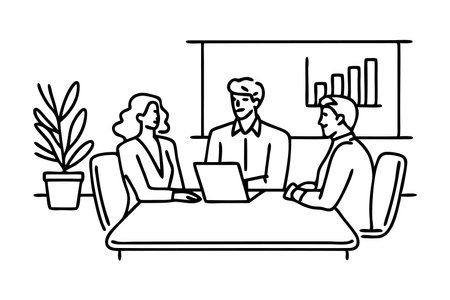1. Failing to Address the Whole Panel
One of the most common mistakes candidates make in US-based panel and group interviews is focusing all their attention on just one person—usually the most senior-looking interviewer or the one who first asked a question. In American workplace culture, this can be seen as disrespectful or inattentive because it may seem like you are ignoring the other interviewers. It’s important to engage with everyone present, no matter their title or role.
Why This Matters in the US
In the US, teamwork and collaboration are highly valued. Companies often use panel interviews to see how well you interact with a group, not just one person. When you address only one interviewer, others may feel left out or think you’re not interested in their opinions.
Tips for Engaging the Whole Panel
| Tip | What To Do |
|---|---|
| Make Eye Contact | Look at each panel member as you answer questions. |
| Use Inclusive Language | Say things like “As you all know…” or “For your team…” instead of addressing just one person. |
| Acknowledge Each Interviewer | Nod or briefly smile at everyone, especially if they ask follow-up questions. |
| Rotate Attention | If someone new asks a question, shift your focus towards them. |
Sample Approach During Answers
If you’re responding to a question, start by making eye contact with the person who asked it, then naturally move your gaze to include the other panel members. This shows respect and helps build rapport with the whole group. Remember: everyone in the room has input on the hiring decision.
2. Overlooking the Importance of Cultural Fit
In US-based panel and group interviews, one common mistake is not showing that you understand or fit into the company culture. American employers care a lot about cultural fit because they want to hire people who will work well with their teams and share their values. If you ignore this aspect, it can really hurt your chances, even if you have great technical skills.
Why Cultural Fit Matters
Companies in the US often look for more than just experience and qualifications. They want to know if you’ll get along with coworkers, respect company values, and adapt to how things are done there. Failing to show this can make interviewers worry that you might struggle to collaborate or be unhappy at work.
How Employers Assess Cultural Fit
| What Employers Look For | How You Can Show It |
|---|---|
| Teamwork and Communication | Mention examples where you worked well with others and supported team goals. |
| Adaptability | Share stories about adjusting to new environments or learning new ways of working. |
| Company Values Alignment | Research the company’s mission and mention why it matters to you. |
| Work Style Compatibility | Talk about how your work habits match the company’s approach (like remote work, flexible hours, or collaboration). |
Tips for Showing Cultural Fit in Interviews
- Do Your Homework: Before the interview, read about the company’s values and culture on their website or social media.
- Use Their Language: Try to use some of the same words or phrases they use to describe themselves.
- Ask Culture-Related Questions: At the end of the interview, ask what makes someone successful there or what the team values most.
- Avoid Generic Answers: Be specific about why you want to work there and how you see yourself fitting in.
If you don’t show an understanding of or connection to the company’s culture, interviewers might think you won’t be happy or productive in their environment. That’s why it’s important to prepare examples that highlight your alignment with their values and ways of working during US-based panel and group interviews.

3. Interrupting or Speaking Over Others
One of the most common mistakes candidates make during US-based panel and group interviews is interrupting or speaking over other people. In American work culture, this behavior is generally frowned upon. Panelists expect active listening and respectful communication from candidates, and talking over others can create a negative impression.
Why Is Interrupting a Problem?
Interrupting shows that you may not respect others’ opinions or are not willing to listen. It also makes it harder for everyone to follow the conversation, which can hurt teamwork and collaboration—two qualities highly valued by US employers.
Key Reasons to Avoid Interruptions
| Reason | Impact on Interview |
|---|---|
| Shows lack of respect | Makes panelists question your professionalism |
| Disrupts flow of discussion | Can cause confusion and frustration among participants |
| Makes you appear impatient | May signal poor listening skills or inability to collaborate |
How to Handle Group Discussions Effectively
- Wait for Your Turn: Let others finish before you start speaking.
- Use Non-Verbal Cues: Nod or make eye contact to show engagement while waiting for your chance to contribute.
- Acknowledge Others: If you want to add something, briefly reference what the previous person said (e.g., “I agree with what Sarah mentioned…”).
- Apologize if You Accidentally Interrupt: Quickly say “Sorry, please continue,” and let the other person finish.
Phrases to Use Instead of Interrupting
| If You Want to Add a Point | If You Accidentally Interrupt |
|---|---|
| “If I may add…” | “I apologize, please go ahead.” |
| “Building on that idea…” | “Sorry for interrupting.” |
| “Id like to offer another perspective.” | “Please finish your thought.” |
Remember, showing respect by letting others speak will help you stand out in US-based interviews as a thoughtful and collaborative team player.
4. Failing to Prepare for Behavioral Questions
Panel interviews in the US often focus on behavioral questions, which are designed to see how you’ve handled real-life situations in the workplace. If you don’t prepare solid examples and stories, you might come across as unprepared or lacking experience. It’s important to understand what these questions are and how to answer them with confidence.
What Are Behavioral Questions?
Behavioral questions usually start with phrases like “Tell me about a time when…” or “Give an example of…” Employers use these questions to predict how you’ll act in future situations based on your past behavior. They want specific examples, not just general statements.
Common Behavioral Question Topics
| Topic | Sample Question |
|---|---|
| Teamwork | Describe a time when you worked as part of a team to achieve a goal. |
| Problem-Solving | Tell me about a situation where you had to solve a difficult problem. |
| Conflict Resolution | Give an example of how you handled a disagreement with a coworker. |
| Leadership | Share a time when you took the lead on a project. |
| Adaptability | Explain how you managed sudden changes at work. |
The STAR Method: Your Best Friend for Behavioral Answers
The STAR method is a simple way to structure your answers:
- Situation: Set the scene—what was happening?
- Task: What was your responsibility?
- Action: What steps did you take?
- Result: What was the outcome?
Example Using STAR Method
Question: Tell me about a time you dealt with a challenging customer.
S: At my previous retail job, we had a customer who was upset about a delayed order.
T: I needed to resolve the issue and keep the customer satisfied.
A: I listened carefully, apologized for the inconvenience, and offered free shipping on their next order.
R: The customer appreciated my help and left positive feedback online.
Avoiding This Common Mistake
If you don’t prepare stories ahead of time, it’s easy to freeze up or give vague answers during panel interviews. Think through your past experiences before the interview and practice telling your stories using the STAR method. Write down several examples that show different skills—teamwork, leadership, problem-solving, adaptability—and be ready to adapt them for different questions.
5. Neglecting to Ask Thoughtful Questions
During US-based panel and group interviews, many candidates make the mistake of not asking thoughtful questions when given the chance. Skipping this opportunity can send a message that you lack interest or initiative, both of which are highly valued by American employers. In the US, interviewers expect candidates to come prepared with insightful questions. This shows that you’ve done your homework, understand the company, and are truly interested in the role.
Why Asking Questions Matters
When you ask meaningful questions, you demonstrate curiosity and engagement. Interviewers often see this as a sign of motivation and critical thinking. On the other hand, failing to ask questions may make it seem like you’re just going through the motions or haven’t prepared enough.
Common Mistakes Candidates Make
| Mistake | How It’s Perceived |
|---|---|
| Saying “I don’t have any questions” | Lack of interest or preparation |
| Asking only about salary or benefits | Too focused on compensation, not on the job itself |
| Repeating questions already answered during the interview | Poor listening skills or not paying attention |
| Not tailoring questions to the company or role | Generic approach; lack of genuine enthusiasm |
Examples of Insightful Questions to Ask
- What does success look like in this position after six months?
- Can you describe the team dynamic and how this role fits within it?
- What are some challenges your team is currently facing?
- How does the company support professional growth and development?
- What do you enjoy most about working here?
Tips for Preparing Your Questions
- Research the company’s mission, values, and recent news before your interview.
- Prepare at least three questions that are specific to the company or position.
- Avoid asking about information easily found on the website or job description.
- Listen carefully during the interview so your questions don’t repeat what’s already been discussed.
- If interviewing with multiple people, try to ask different questions to each panel member based on their role.
Asking thoughtful questions is an easy way to stand out in a positive way during US-based panel and group interviews. It shows that you are proactive, engaged, and seriously considering how you would contribute to the organization.


